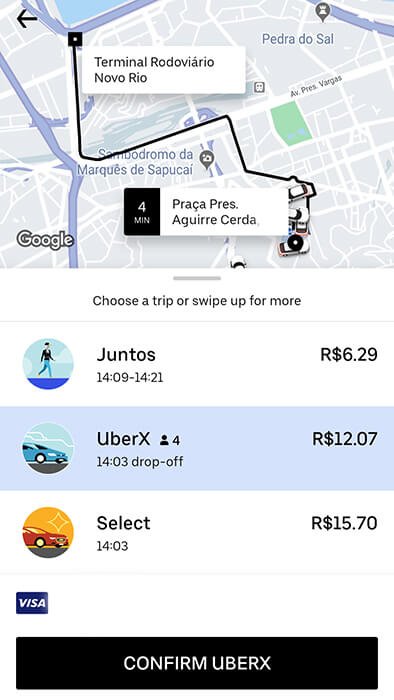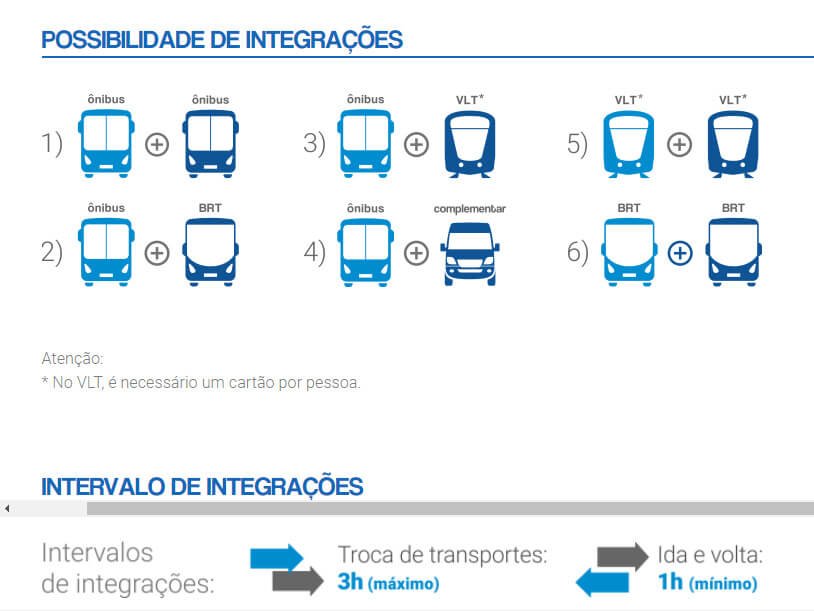Rio de Janeiro is an expensive city. It receives more tourists than any other city in South America, so prices will inevitably be high. If you’re not careful you can find your budget spiralling out of control but fear not. It is still possible to save money in Rio.
Luckily I’ve compiled 9 money-saving tips. None of them are particularly earth-shattering, but if you combine them all you’ll make huge savings.
These tips and ideas come from living here for over a year (and having my amazing Brazilian girlfriend)
Table of Contents
Uber/99
Unless your Portuguese is flawless and you can decipher the thick Caroica accent (locals from Rio), if you want to take a taxi then I’d recommend downloading both the Uber and 99 mobile apps.
You can always hail an official taxi, but be prepared to pay lots more. Official taxis are yellow with a blue stripe. If you go with the yellow taxi then always make sure the meter is running. Although it’s safer than before, I’ve still heard a few too many horror stories to ever feel comfortable flagging down a street cab.
Everyone knows what Uber is, and 99 is very similar. It’s Brazil’s biggest e-hailing app, and it sometimes has cheaper fares than Uber.
Both apps are available for free from the app store.

Taking a bus is another cheap option to save money in Rio (R$4.05 per journey), although the buses can get extremely crowded and uncomfortable. When I say uncomfortable think of Sardines… with elbows, all hot and sweaty after a long day at the office and all holding on to the handrails for dear life as it slams around at crazy speeds with a deathwish.
Graphic enough?
On your bike
I came very late to the bike riding game. Although I dabbled when I was younger (and destroyed my German hire bike within minutes of renting it), it took me until moving to Brazil before I actually learnt how to successfully tame the beast.
Although I’m still not supremely confident on busy roads, cycling is fast becoming my favourite way to get around and explore Rio de Janeiro.
Like other major cities, Rio has a public bike hire scheme. 2,600 bikes with 260 stations, the system is mostly reliable and is a fantastic way to save money in Rio.

The system (and app) is called Bike Itau, and the bikes and stations are easy to spot as they’re bright orange. If you’re in the city for any length of time you can’t help but see them riding around.
You’ll have the option of cycling along the hundreds of kilometres of designated cycle paths or taking to the street. Knowing how people drive here, I go with the path every time.
How do you rent an orange bike? You’ll see when you approach the stations that you need a 5 digit code to unlock the bikes.
You can either:
- Download the app, create an account and add your card details.
- Buy a top-up card from a kiosk
Unlike most things in Rio/Brazil which require you to have a CPF (a personal tax code the locals use when purchasing almost anything), when creating your account you can specify ‘foreigner’ and then send a screenshot of your photo ID.
There are multiple payment options:
- R$5 for 1 day
- R$15 for 3 days
- R$20 for 1 month
- R$50 for 3 months
- R$160 for 1 year
At the present time (June 2019) £1 = R$4.85, so you could get unlimited use of the bike for 1 month for £4.12… which is crazy cheap!
Even if you’re only visiting Rio for a few days it’s still an absolute bargain.
Rio de Janeiro has some incredible cycle routes. My favourite is the ride along the beach from Gloria, along Flamengo beach with Sugarloaf Mountain on your left, through Botafogo, and finally Copacabana and Ipanema beaches.
You’ll need to stop, check your bike into a station to reset the clock, and then be on your way again. You can use the bikes in 60 minute periods before taking them back to a station. If you’re late checking them back in you’ll be charged $5 per hour. This may seem restrictive, but with 260 stations scattered around the city finding one is fairly easy. The app also displays how many bikes and free spaces are available.
Eat from the street
Unlike some countries where it’s best to avoid street food (or risk a trouser explosion), Brazilian street food is usually really good!
From tiny little BBQ sets popping up on a Friday night to families that have been cooking on the same corner for years, you can find cheap street food almost anywhere in Rio.
You can usually guess what the meat is, but even if you can’t it’s usually well cooked and tasty (I understand that may not be the most glowing recommendation, but we’re all about honesty here).
The smell of barbequed meat is a staple aroma on the weekends, so just be sensible. If there are lots of people eating or queuing up, that’s usually a good sign it’s decent food.
Some of the foods you’ll enjoy include:
- Coxinha (shredded chicken in a dough – pronounced Cosheenya)
- Kibe (also spelt kibbeh – a classic Middle Eastern dish usually cooked by entrepreneurial immigrants)
- Pão de queijo (cheese bread)
- Empadas (small little pies filled with meat, chicken, cheese, shrimp etc)
- Pastel (deep-fried pastry filled with meat, cheese, sausage etc)
- Açaí (crushed açaí berries with sugar and ice is the classic, although you can also get with strawberry, granola, doce de leite etc)

Names on the list
Maybe it exists elsewhere, but it was new to me. If you hear about an upcoming event – a beer festival, dance party, street market etc check Facebook for an event. Practically all will have one and you’ll be able to check the price, location and rules in the description.
Lots of them will also mention that if you add your name in the comments they’ll put you on the guest list. This can either mean free entry before a certain time or a reduced entry price.
The party (any party) in Rio tends to start late and ends when it wants to end. If you’re willing to arrive a little earlier you can save on the price of the admission.
For example, in Lapa (downtown Rio) there was a band playing that we were interested in seeing. If we put our names on the list we could have free entry before 20:00. Nobody goes out before 8pm in Rio! Luckily I’m British, so I’m used to starting the session at midday.
We arrived, grabbed a couple of beers and sat down for the long wait before the band started (supposed to be at 22:00, but it was actually closer to 23:00).
To our delight (because it was ‘crazy early’) the band came out to do their soundcheck, so we were treated to 4 or 5 full tunes with a little bit of jamming for good measure. That was enough for us so we finished our beers and left. Free gig!
Stay downtown
If you’re visiting Rio then you’ll probably be wanting to stay by the beach. It’s understandable. There are some world-famous beaches in Rio (although the prettier ones are outside the city of Rio – Arraial do Cabo, Cabo Frio, Buzios, Ilha Grande, Paraty etc).
While you can find some cheap accommodation in Botafogo (close to Copacabana beach), I’d recommend going downtown.
I’ve lived downtown in Lapa on and off for the last 2 years and it’s a dream location.

Lapa is described as ‘the bohemian heart of Rio’, although the Brazilian definition of bohemian is a little different than the western version.
LOTS of bars, pretty much always somewhere to dance, a ton of restaurants/cafes and lots of craft markets and sellers. It’s noisy, a little dirty and sometimes has a dodgy atmosphere but it’s certainly alive. You’re also next door to Santa Teresa which is another magical little place with amazing views and a great chill vibe.
Lapa is also a great location if you’re interested in tours in Rio de Janeiro. There are lots of free walking tours that start in Lapa and head all over. You’re only a 15-minute walk from the Sambodroma – the stadium where the finals of Rio Carnival are hosted and judged. You can learn all about the history of the samba schools and samba parades.
Other tours take you to the Valongo Wharf where you can learn all about the African heritage and history of the slave trade that brought the 2 million slaves!
Accommodation here is much less than near the beaches. And the best thing? You’ll be a 20 minute walk/5 minute cycle from the Port Zone/Centro – home to lots of museums, exhibitions, walking tours etc And when you’re bored of them and want to feel the sand between your toes? Take a 15-minute cycle or 25-minute bus and you’re there.
There are plenty of hostels, but I’d personally choose an Airbnb as you can usually find awesome deals. You can also find plenty of amazing Airbnb Experiences in Rio, from bar crawls to paragliding to private tours and hikes (but these are luxuries. If you save enough with the other tips and advice then maybe you can splash out on one or two).
For complete transparency, if you use our Airbnb link, you’ll receive £25 in travel credit when you sign up, and we’ll get £15 credit too… winner winner chicken dinner!
Cheap flights
(This technically isn’t only to save money in Rio, but definitely useful when you’re here)
If you’re planning on taking an internal flight in Brazil (and it’s a massive country so it makes sense) then give Maxmilhas and Trip.com a look.
While I’m a huge fan of Skyscanner, when in Brazil I’d highly recommend searching Maxmilhas and Trip.com for deals.
Maxmilhas is a site where people can buy and sell their Airmiles. This effectively means you can get some great deals on flights using a combination of miles and money.

Trip.com is another flight comparison site, but I’ve found some amazing deals with them. Flying from Fortaleza to Rio would normally cost around R$500, but we found flights through Trip.com for R$120!
One thing to note with Trip.com was that we only found these super cheap flights on their website after midnight. During the daytime the prices would be ‘normal’ and the deals would only pop up late in the evening.
Discount Days
While I am happy to pay to enter museums, galleries and exhibitions to support them, free entry is always fun.
There are plenty of free attractions in Rio de Janeiro:
- CCBB (Cultural Centre of the Bank of Brazil – art gallery, cinema and theatre)
- Parque Lage (a beautiful park sitting at the foot of the Christ the Redeemer hill)
- Escadaria Selarón (world famous staircase made famous by many international music videos)
- Lots of hikes (Pedra Bonita, Sugarloaf Mountain, Dois irmãos etc)
- Museum of Tomorrow (amazing space-age building and free to enter on Tuesdays)
- Centro Cultural dos Correios (a post office with some awesome galleries and exhibitions)
- Caixa Cultural (yet another awesome and free exhibition centre)
- Free walking tours (plenty of daily tours exploring all aspects the life and history in Rio)

This list doesn’t include all the beaches, the random Sambas that pop up everywhere and the untold amount of street markets that just appear overnight.
Whatever your preference, there are plenty of opportunities to explore the local culture whilst you save money in Rio.
Before you arrive it’s also worth checking out Rio Times Online. It provides news and information on all things Rio, and handily all in English. The entertainment and nightlife sections can also give some ideas for upcoming and current events.
Get a Riocard Mais
There have been many variations and iterations of the Rio travel card. Previously they had different cards for different modes of transport (Bilhete Unico Carioca, Rio Card, Aquaviario etc) but now they have one card to rule them all.
Riocard Mais is a top-up travel card which can be used on all forms of transport – bus, tram, subway, ferry etc. This means no issues with fumbling around with coins or searching for the right card.
You can get the Riocard Mais from the airports and major subway stations. Once you put money on you can track your usage and recharge through the app or website.
Whilst saving stress, the card also has a few ways to help you save money in Rio. If you need to make a connection on your trip (bus then VLT, VLT then BRT or any combination) and the gap in between is less than 3 hours then you only pay for the first part of the trip.

This can be a good money saver if you’re travelling across the city as it’s pretty huge!
Free accommodation
How would you like free accommodation in Rio de Janeiro?
If you’re staying for any length of time then you should consider signing up for Worldpackers.
Worldpackers is a company that allows you to exchange your skills for accommodation. You don’t need a work visa as it’s classed as volunteering, so anyone can give it a go.
The projects they have in Rio include photography, working on permaculture farms, cooking, hostel receptions, web development, party promotion and so much more. You agree to stay for a certain period, from 1 week up to 3 months, and then work a set amount of hours per week.
For your work you get free accommodation, sometimes free meals, free parties etc The other benefits include the ability to meet and work alongside fellow travellers, get a true local experience, supercharge your language learning and develop new skills. And did I mention you won’t pay a penny for accommodation?
You’ll need to create an account and sign up for a membership ($49), but this pays for itself in no time with the savings on accommodation. Once you sign up then you can start applying. They have placements all over the world, so it’s a great investment.
Conclusion
Rio can be an expensive city, but it doesn’t have to break the bank. You can easily enjoy Rio on a budget.
You can enjoy the beaches, the natural beauty and then soak in all the history and culture without spending a dollar.
If you choose to take the paid tours and get chauffeured around everywhere then you’ll end up spending a fortune, and that’s cool too. Not everyone is on a budget, but if you are then you can have just as much fun. However long you’re visiting for, whether it’s just for Carnival, working on your suntan at Copacabana and Ipanema beaches or hiking through the surrounding mountains (I totally recommend that too!), make the most of your experience with these tips.
If you need to brush up on your Portuguese then be sure to check out my review of the best language learning apps of 2019.
If you’re travelling specifically for Rio Carnival then be sure to check out my survival guide to Rio Carnival.
If you want more information about Worldpackers, I wrote a guest post explaining the signing up process.
If you plan on spending more than 3 months in Rio de Janeiro then learn how to extend your Brazilian tourist visa.


